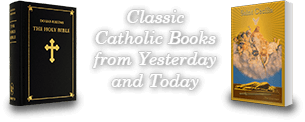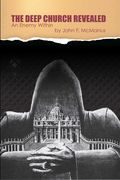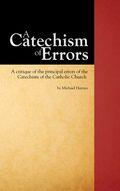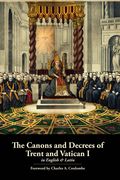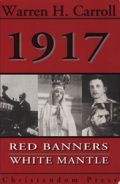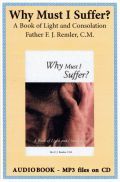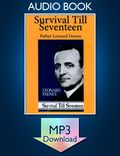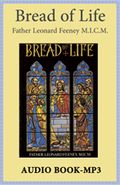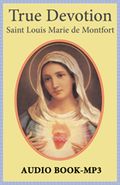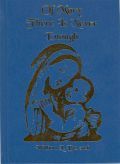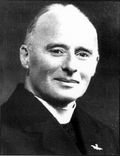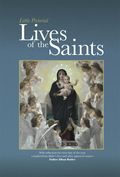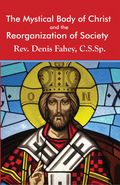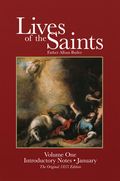Categories
Information
All Products
By John F. McManus - 244 pages PB
This book, written by a prominent and well known Catholic American, is
the product of almost seventy years of close observation and deep study in a
turbulent world of rapid change and degradation of church and society.
Recently, the courageous Archbishop Carlo Maria Viganò published an acknowledgment
of the problems discussed in this book in his now world famous Open Letter to
President Trump where he spoke of Freemasonry and the ‘deep church’. Because
that letter appeared as this book was going to press, The Deep Church Revealed
was added to the original title as a fitting description of its content.
The revealing begins with a description of the Enlightenment philosophers
and their anti-Catholic hatred, and the author proceeds from there to detail in
forty-one astonishing chapters the story of how those men and the organizations
they inspired grew and and spread their pernicious doctrines throughout the
world and the Church.
The plans that these Freemasonic organizations laid were remarkably successful,
even though vigorously opposed by every Pope for over 200 years. “An
enemy hath done this” Our Lord said in the parable of the wheat and the cockles.
Truly, this can be said today of the situation in His Church. The holy and
vigilant Padre Pio told Fr. Luigi Villa in 1963 when he assigned Fr. Villa the task
of exposing these enemies “Courage, courage, courage! For the Church is already
invaded by Freemasonry that has already reached the Pope’s slippers.”
We are thankful to Mr. McManus for telling this story briefly, succinctly,
and with unbounded love for our Holy Mother the Church. He advises us,
like Saint Peter, “Be sober and watchful, for your adversary the devil goeth
about like a roaring lion, seeking whom he may devour. Whom ye should
resist, fortes in fide.”
By Michael Haynes with an Introduction by Archbishop Viganò - PB 164 pages
Sixty years after the Pastoral Council, that the promotional advertising told us was to usher in a new springtime for the Church, is sufficient time for the faithful to stand back and calmly observe the glorious fruits of the work of that Council. We at Loreto have done so, and many Catholics (even some who have spent years committed to implementing the principles of Vatican II) have done so as well. The historical facts appear to us to belie the promises made by Pope John XXIII and others.
As Pope John Paul II said, three of the most important fruits of the Council are: the New Liturgy and sacramental rites, the New Code of Canon Law and the New Catechism. With all of these brand new and very modern(ist?) post-Conciliar alterations in the laws and teachings of the hierarchy forced upon the faithful having had its trial of sixty years, it is now time to judge these fruits objectively. Surely, even those who have collaborated, either wholeheartedly or with reservations, in the advancement of these changes must agree that a just and prudent accounting should now be made of the blessings or curses upon the Church and the world resulting from the work of the Council.
This penetrating analysis produced by Michael Haynes under the direction of a faithful Priest, and prefaced by a faithful Shepherd, Archbishop Carlo Maria Viganó is what we hope will be a first of many groundbreaking studies of the new Catechism.
The Canons and Decrees of Trent and Vatican I - In Latin and English - PB 170 pages
Here you will find all of the essential documents and infallible teachings of these two modern councils of the Catholic Church. They are beautifully laid out in a two-column format with large readable fonts of both the original Latin and Cardinal Manning's English translation side by side.
Foreword
To say that the Catholic world is in a state of doctrinal confusion today would be an almost comical understatement, were not the issues involved—the individual salvation or damnation of every man, woman, and child on the planet—so important. Despite the wealth of defined dogmatic teaching that the Church has produced over twenty centuries, the actions of many prelates, priests, and theologians (some in the highest reaches of the hierarchy) have obscured the truths of the Faith for many, if not most, Catholics and non-Catholics.
This has happened before. In the 16th century, the successive revolts of Martin Luther, John Calvin, and Henry VIII and their brethren, together with pre-existing abuses and doctrinal questions that opened the door for their defections, created an enormous amount of confusion in the Church. All areas of Catholic life—pastoral, devotional, and liturgical—suffered. As kings and princes began to create their own state churches and enforce membership in these fake churches on their hapless subjects, Pope Paul III (1534–1549) decided, in concert with Holy Roman Emperor Charles V, that the time had come to call a new Ecumenical Council. This was slated to air Protestant complaints, reform Catholic practices, define or redefine disputed dogmas, and reconcile Christian princes, with a view to uniting Christendom and reviving the Crusades. Pope and Emperor agreed that it would convene at Mantua on May 23, 1537. Renewed war broke out between the Emperor and the French, thus delaying the opening. Two years of delays led the Pope to cancel the whole process.
Emperor Charles V, however, was very keen on the idea, and on December 13, 1545, the Council at last convened at the city of Trent. The seat of a Prince-Archbishopric of the Holy Roman Empire, it was Charles’ choice for the Council’s location. During the next few years in eighteen sessions, doctrinal decrees would be issued on the Holy Scriptures, Original sin, Justification, the Sacraments in general, Baptism, and Confirmation. An outbreak of the plague and various other things, including Paul III’s death, led to the Council being prorogued indefinitely on September 17, 1549.
The new Pope, Julius III (1550–1555), agreed with Charles V that there should be no further delay. The Council Fathers gathered at Trent on May 1, 1551. The Emperor and Pope concurred that the Protestants should appear at the Council and present their case—although without being able to vote. Although some of the Reformers did set out for the Council, in the end none appeared because of their inability to vote. Nonetheless, important work was done, and decrees defining Catholic teaching on the Holy Eucharist, Penance, and Extreme Unction were passed by the delegates. Unfortunately, at this juncture, the Emperor’s war against the Protestants took a turn for the worse, and Maurice, the Elector of Saxony invaded Tyrol. The Council was broken up by the threat on April 28, 1552. As Julius III retreated ever more into his strange interests, the prospect of reconvening the Council receded, while his successor, the stern reformer Paul IV, had other fish to fry in clearing out from Rome the moral detritus left by Julius. Moreover, Charles V had abdicated in 1555; his brother and successor as Holy Roman Emperor, Ferdinand I, was not as interested in Council as his brother had been—at least initially.
Pius IV (1559-1565) was determined that the council should be reopened and brought to a successful conclusion. From January 18, 1562 to December 4, 1563, the Council met at Santa Maria Maggiore, and continued until its final adjournment on 4 December 1563. The final doctrinal decrees were on Matrimony; Cults of Saints, Relics, and Images; and at last the very topic that had excited Luther so much way back in 1517: Indulgences. The documents were signed at last by 255 Council Fathers, and the bull of ratification was published by the Pope on January 26, 1564.
The Council had asked the Pope to continue its work by publishing definitive versions of a catechism based upon its decrees; shepherded through by Pius IV’s nephew, St. Charles Borromeo, this appeared in 1566, and remains today as the most clear, unambiguous, and authoritative catechism in print. Having appeared under St. Pius V, the catechism was soon joined by revisions of the Breviary and Missal, the latter of which remained substantially unchanged until the mid-20th century.
Almost two centuries later in the 18th century, the Catholic world had changed considerably. On the one hand, Latin America, the Philippines, and various other new regions had been added to the Church; but on the other Protestantism had solidified into its own bloc of nations, the Enlightenment and the French and succeeding Revolutions had toppled Monarchs, and there was no more Holy Roman Emperor. Scientism and Socialism were sapping the faith even of Catholics—and the supposedly Catholic government of the new Italian Kingdom was struggling with the Papacy for control of the remainder of the Papal States. At any moment, Bl. Pope Pius IX (1846-1878) faced an imminent invasion of his own capital, Rome.
The many struggles around the world between Catholics and governments intent on usurping the rights of the Church in various ways were at once symbolized by and subsumed into the one the Pope faced. This fact, combined with the spread of the telegraph, newspapers, and steamships put the Pope very much into the forefront of the Church’s worldwide struggle. The Ultramontanist party in every Catholic land called for the closest possible unity between the national Churches and the Holy See and with each other. In the face of all of this, Bl. Pope Pius IX convoked an Ecumenical Council, Vatican I.
Although they all refused in varying tones from polite to contemptuous, all of the Eastern Orthodox Patriarchs had been invited as full participants to the Council by the Pope as an attempt to end the Eastern Schism.
Opening on December 1869 at St. Peter’s Basilica rather than the Lateran (where the prior five councils in Rome had met) and adjourned on October, 20 1870, a month after the Italians at last conducted their long-threatened seizure of Rome, Vatican I accomplished far less than Trent. Nevertheless, it did deal definitively with two important matters. The first—the pretended clash between Faith and Reason, which Liberalism had pushed to the forefront of national life in so many countries—was dealt with in the Dogmatic Constitution on the Catholic Faith (Dei Filius). Far more controversial and hotly debated at the time was the dogma of Papal Infallibility, at last defined in the First Dogmatic Constitution on the Church of Christ (Pastor aeternus). The Council was then prorogued. It would not be officially concluded until the eve of Vatican II.
Much of course has changed since then. But what has not changed is the essential nature of these defining documents. Regardless of changes in technology, fashion, liturgy, or anything else, these pages contain the bare minimum of what it is to be Catholic: if one can read it all and agree with it all, he is a Catholic; if not, not. In the current period of confusion, a clear guide to spiritual reality such as this is utterly essential; we all owe a debt of gratitude to Loreto Publications for making it available.
Charles A. Coulombe
Trumau, Austria
Vigil of the Nativity of St. John the Baptist - 23 June 2022
The Council of Trent
Symbol of Faith - Canonical Scriptures - Original Sin - Justification, Sin, & Merit - The Sacraments in General - Baptism - Confirmation - The Eucharist - Penance - Extreme Unction - Communion: Under both Species & of Children - The Mass - Holy Orders - Matrimony - Purgatory - Relics - Indulgences - Profession of Faith
The Council of Vatican I
Dei Filius
Dogmatic Constitution on Faith - God the Creator - Revelation - Faith - Faith & Reason — Canons: God the Creator: Revelation: Faith: Faith & Reason
Pastor Æternus
The Church of Christ - Papal Primacy - Perpetual Papal Primacy - Nature of Papal Primacy - Papal Infallibility
Warren Carroll
Since the earliest days of the Church, there has been no date more crucial to universal Christendom than the year 1917. We are still living the horror of the aftermath of the Communist rebellion; and, on the other hand, we are still living under the hope, yet to be fulfilled, of Our Lady of Fatima's promises. 1917: Red Banners, White Mantle introduces these two principal world events of that year one heavenly, one diabolical; the consequences under which we still live. On the one side we see the unholy, Rasputin and Lenin, on the other we see the marshaling of the holy, under Mary, the enlisting of whose troops began with three shepherd children of Portugal. The scourge, in all its historical force and brutality, is vividly related against the backdrop of the healing remedy, the old serpent spitting against the heel of the Woman about to crush his head. Few readers will put this book down before the story reaches its conclusion.
This small hardcover book of 122 pages is a little gem of meditations from the saints and the author himself on Our Lady.
Father Denis Fahey - MP3 - Audio Book on CD
“I repeatedly promised Saint Peter that if I ever got the chance, I would teach the truth about his Master in the way he and his successors, the Roman Pontiffs, wanted it done. That is what I have striven to do and am doing.”
—Rev. Denis Fahey
The principal purpose of The Mystical Body of Christ in the Modern World is to deal, from the theological, philosophical and historical standpoint, with the modern revolt against the divine plan for the organisation of human society.
Dr. Fahey writes at length of the various errors and the nefarious forces which at present menace the divinely-constituted social order. His work is a most important one. Perhaps never before, since the establishment of Christianity, has there been such an organized effort to overthrow it, to dethrone Christ, to destroy His Church, to set aside God and the order which He has established. In some countries, notably Russia, Mexico, and Spain, the veil of secrecy has been withdrawn; in many others the same Masonic and Communistic influences are at work, but their activities are to a large extent underground.
An essential prerequisite for a proper preparation (to defend the Church) is a knowledge of the nature and extent of the menace, of the organization of the forces behind it, and of the diabolical hatred of Christianity and of everything supernatural with which these forces are imbued. This knowledge is to be found in Dr. Fahey’s work; in fact nowhere else, as far as we know, is there such a logical, co-ordinated treatment of the subject.
TABLE OF CONTENTS
Prefatory Letter
Loreto’s Introduction
Forward
Forward to the Second Edition
Forward to the Third Edition
Chapter 1
The Theology of History
Chapter 2
The Organization of Society
Chapter 3
The Lutheran Revolt
Chapter 4
The Revolutionary Deification of Man
Chapter 5
The Declaration of the Rights of Man
Chapter 6
The Agents of Revolution
Chapter 7
Pius IX and the Pantheistic Deification of Man
Chapter 8
The Modern Struggle Around the Kingship of Christ
Chapter 9
Catholic and Communist Ideals
Chapter 10
State Organization and the Kingship of Christ
Chapter 11
The Struggle of the Jewish Nation Against the
True Messias
Appendices
1. Jewish Power
2. The Forces that Govern
3. Germany
4. Spain
5. “The Protocols of the Elders of Zion”
6. Freemasonry
7. France
Index
Father Alban Butler - 538 pages - Illustrated - EBOOK as PDF only
With reflections for every day of the year compiled from Butler’s Lives and other approved sources
This beautifully illustrated book is the perfect solution for so many Catholics anxious to get reacquainted with the lives of the saints, but who have too little time to read more thorough biographies. There are approximately five hundred entries covering the feast days for each day of the year with an accompanying pictorial sketch of the saint being honored, and some pious reflection useful for daily meditation.
This is the original version of Butler’s Little Pictorial Lives first published in 1874 and largely taken from Butler’s original work. This work is a popular, but very scholarly, abridgement of the complete Butler’s Lives published in twelve volumes in 1847. That is the best edition of Butler’s work with no late 19th or early 20th century ‘modernizations.’
This collection makes excellent reading at table or after the family rosary where in the bosom of intimate familial unity, the history of sanctity may be passed to young minds eager to hear stories of true heroism. Many saints, indeed some very well known and popular ones, took their first steps toward a life of heroic virtue by reading or hearing the lives of other saints who went before.
Father Alban Butler was born in 1710, at Appletree, North-amptonshire, the second son of Simon Butler, Esq. Orphaned at the age of eight, he was sent to be educated at the English College, Douay, in France. In 1735, Butler was ordained a priest. At Douay, he was appointed professor of philosophy, and later professor of theology. It was at Douay, he began his principal work The Lives of the Fathers, Martyrs and Other Principal Saints. He also prepared material for Richard Challoner’s Memoirs of Missionary Priests, a work on the martyrs of the reign of Elizabeth.
He labored for some time as a missionary priest in Staffordshire, and was finally appointed president of the English seminary at Saint Omer in France, where he remained till his death in 1773.
Fr. Denis Fahey C.S.Sp. - 820 pages - EBOOK as PDF, EPUB, or Kindle
“I repeatedly promised Saint Peter that if I ever got the chance, I would teach the truth about his Master in the way he and his successors, the Roman Pontiffs, wanted it done. That is what I have striven to do and am doing.”
—Rev. Denis Fahey
Originally published in 1945, just eight years before his death, this is Fr. Fahey’s magnum opus. All of his written work is centered around the Kingship of Christ and his right to rule over all human societies and governments. Just as we daily pray that God’s will be done ON EARTH as it is in heaven, it follows that all human works, especially the government of all of our human societies (the family, the state, the Church in her human aspects) must conform to God’s will and not He to ours.
This book details the Rights of God in human governments. He has the RIGHT to be obeyed, even by the state. This book proposes the RE-organization of society according to God’s will for us on earth and within the context of the Mystical Body of Christ. Human governments will only be as good as they can be in this fallen world insofar as they conform to God’s Divine Plan for Order in establishing and running society. Here is that plan as laid out by God and his Church and explained by Fr. Fahey. Only when man puts God’s Rights first, will there be any hope of Human Rights being respected or upheld.
Rev. Alban Butler's ORIGINAL Lives of the Saints Vol. 1 - EBOOK - PDF, Kindle, & EPUB
Introduction, Prefaces, and January - Hardcover - Illustrated -520 pages
Very few published works require such a lengthy explanation of exactly WHICH edition is being offered, in what format, and why, than Fr. Alban Butler’s Lives of the Saints. The reason is that there are so many very different books being printed under this author’s name and under this title due to it’s long history (the work is almost 300 years old) and its universal popularity. Few catholic books except the Bible, the Confessions, the Imitation, and the Summa, are as widely read. This book has also been extensively revised, altered, and updated since its original publication, with new editions, even 21st century revisions being made, that we feel the time is ripe for an original, unexpurgated, and unrevised print version to be made available.
This edition is widely considered to be the most complete and authoritative ever issued. It is the 1854 edition of D. J. Sadlier of New York, and in the Preface it gives its “pedigree.” The original was printed anonymously in London in 1759, after 30 years work on the project. The edition published by Sadlier is an exact replica of the Dublin and London edition of 1833. Being a scholarly work, but also a work deeply imbued with the piety and devotion of a priest’s lifetime effort, it is loaded with footnotes which comprise a significant proportion of the total text. In the original book, the footnotes were printed in such a small, closely-set typeface, that they were almost unreadable.
Loreto Publications has utilized the recent development of OCR scanning to extract the original text and to put it into a modern, highly readable, and much larger font typeface than any of the old editions. We have extensively proofread the text thus generated, and have made the layout “user friendly” as the moderns so succinctly state. In addition, our already available edition of Butler’s Little Pictorial Lives—which is a drastic abridgment of this original edition to one volume, illustrated, with one saint and one image for each day of the year—has provided us with 365 beautiful 19th century engravings which we have added to this original un-illustrated text.
Loreto has made a few corrections of obvious typographical errors and has slightly altered some capitalization rubrics and some spellings, but we have has refrained from alterations to the text. We think that modern readers are not so uneducated as to need the work “updated” for them, either as to content or style, since the beautiful expressiveness of Butler’s 18th century grammatical and rhetorical mastery is not so far removed historically as to render it unintelligible to any ordinary 21st century reader. We are certain that our readers will appreciate the original work for its piety, beauty, and comprehensive scholarship.
A great man once said that “History is the laboratory of Wisdom.” And where do we find the best history? It is found in the lives of the saints, for it is through their lives on earth, lived within the union of Christ’s mystical body, the Catholic Church, that we see the only history that truly matters for all eternity.
This spectacular history by Fr. Alban Butler, The Lives of the Saints, presents to the reader the life story of over 1600 saints and their times. In the original introduction we find this bold statement:
“It is on this account we have ventured to designate The Lives of the Saints an historical supplement to the
Old and New Testaments. We think this work deserves to be so considered, on account of the close resemblance it bears to the historical portions of holy writ. Let the divine economy, in this respect, be for a moment the subject of
the reader’s consideration.”
Loreto Publications has here reproduced the finest original edition of the text from the early 19th century with no modernization, alterations, deletions, or additions to the product of Father Butler.
Father Alban Butler was born in 1710, at Appletree, Northamptonshire, the second son of Simon Butler, Esq. Orphaned at the age of eight, he was sent to be educated at the English College, Douay, in France. In 1735, Butler was ordained a priest. At Douay, he was appointed professor of philosophy, and later professor of theology. It was at Douay, he began his principal work The Lives of the Fathers, Martyrs and Other Principal Saints. He also prepared material for Richard Challoner’s Memoirs of Missionary Priests, a work on the martyrs of the reign of Elizabeth. He labored for some time as a missionary priest in Staffordshire, and was finally appointed president of the English seminary at Saint Omer in France, where he remained till his death in 1773.

